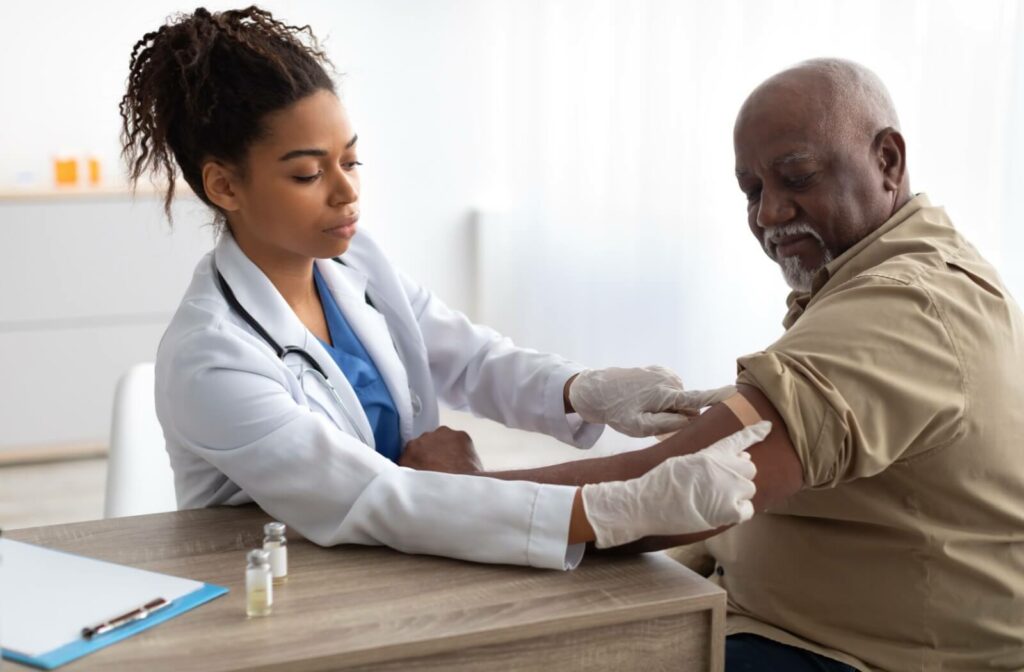A large part of taking care of your health is being proactive about your well-being. This is especially important for older adults, who are at a higher risk of developing certain health conditions such as heart disease, diabetes, or osteoporosis.
Regular check-ups and screenings play a critical role in catching potential issues early, allowing for timely treatment and effective management. These routine visits with your healthcare provider can also help monitor existing conditions, offer personalized advice on maintaining a healthy lifestyle, and help you enjoy greater peace of mind as you age.
A comprehensive wellness check-up schedule for older adults may include a combination of screenings, immunizations, and discussions with your healthcare provider. This can vary depending on your age, gender, family history, and current health status. It is important to work closely with your healthcare team to determine which screenings are most appropriate for you.
What Are Some Common Screenings for Older Adults?
Here are some important screenings recommended for older adults:
- Blood Pressure: High blood pressure (hypertension) is a major risk factor for heart disease, stroke, and kidney disease. It is recommended to have your blood pressure checked at least once a year if you are 40 years or older.
- Cholesterol: High cholesterol levels can lead to plaque buildup in arteries and increase the risk of heart attack and stroke. Most older adults should get their cholesterol checked every 4-6 years. After age 40, it’s recommended to get your cholesterol checked annually.
- Diabetes: Routine blood sugar tests are important for detecting type 2 diabetes, which often goes undiagnosed in older adults. The American Diabetes Association recommends getting tested every 3 years starting at age 45.
- Colon Cancer: Adults aged 45 and above should get regular colon cancer screenings such as a colonoscopy or stool test.
- Breast and Cervical Cancer: Women aged 50-74 should get a mammogram every 2-3 years to screen for breast cancer. Women between the ages of 21-65 should have regular Pap smears to detect cervical cancer.
- Osteoporosis: Bone density screenings are important for women over 65 and men over 70, as well as younger individuals with specific risk factors such as family history or certain medical conditions.
Immunizations for Older Adults

In addition to routine screenings, staying up-to-date on immunizations is crucial for maintaining good health as we age. Here are some important immunizations recommended for older adults:
- Influenza (Flu) Vaccine: The flu vaccine is recommended annually for everyone over the age of 6 months. However, it is especially important for older adults who are at higher risk for developing serious complications from the flu.
- Pneumococcal Vaccine: This vaccine protects against serious pneumococcal diseases such as pneumonia, meningitis, and blood infections. The CDC recommends pneumococcal vaccination for adults 65 years or older.
- Shingles Vaccine: Shingles is a painful rash that can occur in individuals who have had chickenpox. The CDC recommends a single dose of the shingles vaccine for adults over the age of 50.
- Tetanus, Diphtheria, and Pertussis (Tdap) Vaccine: This vaccine protects against tetanus, diphtheria, and pertussis (whooping cough). It is recommended for adults once every 10 years.
- Measles, Mumps, and Rubella (MMR) Vaccine: If you were born after 1957 and have not already received 2 doses of the MMR vaccine or do not have evidence of immunity to measles, mumps, and rubella, it is recommended that you receive this vaccine.
It is important to note that these are just some of the immunizations recommended for older adults. Your healthcare provider will determine which vaccinations are appropriate for you based on your age, health history, and risk factors.
Health Screenings for Memory Loss
As we live longer, it’s important to monitor our cognitive health and screen for memory loss or dementia. Some common health screenings recommended for older adults include:
- Mini-Mental State Examination (MMSE): This test assesses a person’s orientation, attention, memory, language, and visual-spatial skills.
- Geriatric Depression Scale: This screening assesses symptoms of depression in older adults, which can impact overall cognitive function.
- Clock Drawing Test: This involves asking people to draw a clock face with specific instructions to evaluate their cognitive abilities.
- Functional Activities Questionnaire (FAQ): This screening assesses an individual’s ability to perform daily tasks and activities, which can be impacted by memory loss.
It is also recommended that you discuss with your healthcare provider any changes you have noticed in your memory or cognitive function. Early detection and treatment of memory loss can greatly improve the quality of life for older adults.
Prioritizing Health & Wellness at Juniper
Talk to your healthcare provider about the right screenings for you based on your age, medical history, and lifestyle. Staying on top of health screenings is a great way to catch potential issues early and keep yourself feeling your best.
At Juniper Village at Washington Square, we understand the importance of health screenings and a comprehensive wellness check-up schedule for our residents. Our team works closely with residents and their families to ensure they receive the appropriate screenings and care for their needs. We also offer a variety of wellness programs and activities to promote overall cognitive health and well-being.
Learn more about our community and how we prioritize the health and wellness of residents by visiting our website or scheduling a tour.







